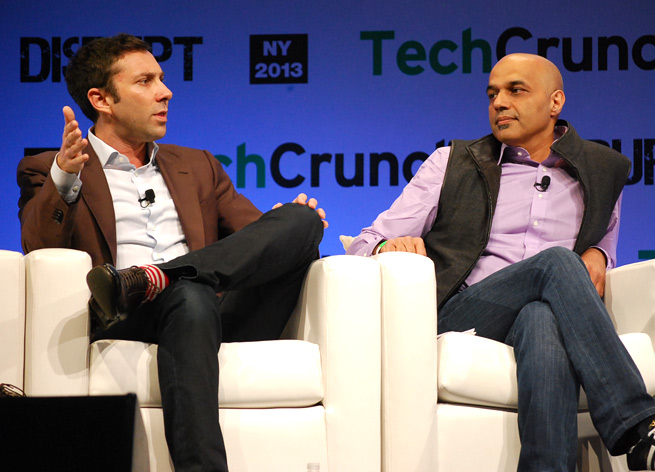Transportation startups are a hot thing now, with Uber, Hailo, SideCar, Lyft, and others getting a lot of attention and controversy. But this space is a battleground with regulators attempting to stop innovation and some startups getting more favorable treatment than others.
[aditude-amp id="flyingcarpet" targeting='{"env":"staging","page_type":"article","post_id":728890,"post_type":"story","post_chan":"none","tags":null,"ai":false,"category":"none","all_categories":"business,","session":"D"}']The CEOs of ride-sharing service SideCar and taxi-hailing app Hailo showed that tension in a combative panel today at TechCrunch Disrupt NY.
SideCar CEO Sunil Paul (pictured, right) took a lot of shots throughout the conversation. His biggest target was New York City’s Taxi & Limousine Commission (TLC). He said the TLC is using its power to protect taxis and apps that coordinate with the industry like Hailo and Uber.
AI Weekly
The must-read newsletter for AI and Big Data industry written by Khari Johnson, Kyle Wiggers, and Seth Colaner.
Included with VentureBeat Insider and VentureBeat VIP memberships.
“The TLC protects the taxi industry, and I don’t think anyone can deny that fact,” Paul said. “SideCar driver shifts are voluntarily and payment is voluntary. It is the regulation of taxis that is an illegal restraint of trade.”
Paul is understandably frustrated. This past weekend, New York City police targeted SideCar drivers in a sting operation. In a blog post, the company wrote that a SideCar driver named Sandra was interrogated by police and her new car was impounded.
“People are being treated like criminals for doing something that might threaten the taxi industry,” Paul said. “Sharing is not a crime. We want to make sharing possible in New York.”
By comparison, Hailo and Uber have just received approval from the TLC to operate e-hailing taxi services in NYC. With a few taps on your smartphone, you can now have a taxi come pick you up wherever you are in the city.
Hailo CEO Jay Bregman said he was happy about the development. He took the jabs from Paul quietly but finally responded when he’d had enough. Bregman said his company was part of a “broadening” taxi industry that has begun to innovate.
He said his service had paid out “millions” to taxi drivers in cities where Hailo already operates. He praised taxi drivers for embracing innovation. Paul said he didn’t have a problem with drivers, but with governments.
[aditude-amp id="medium1" targeting='{"env":"staging","page_type":"article","post_id":728890,"post_type":"story","post_chan":"none","tags":null,"ai":false,"category":"none","all_categories":"business,","session":"D"}']
“Taxi drivers are great, but they are protected by a monopoly,” Paul said.
Hailo has only been operating in cities around the world for 14 months, so Bregman also said he was pleased that it only took that amount of time before the TLC approved his service.
“You can be disruptive without being abrasive,” Bregman said.
Paul shrugged off Bregman’s comment, saying, “If you want to be disruptive, you have to be willing to piss people off.”
[aditude-amp id="medium2" targeting='{"env":"staging","page_type":"article","post_id":728890,"post_type":"story","post_chan":"none","tags":null,"ai":false,"category":"none","all_categories":"business,","session":"D"}']
At the end of the panel, the two did eventually hug, but it’s understandable why they are so at odds at the moment.
Check out the conversation in full below:
Photo via Sean Ludwig/VentureBeat
[aditude-amp id="medium3" targeting='{"env":"staging","page_type":"article","post_id":728890,"post_type":"story","post_chan":"none","tags":null,"ai":false,"category":"none","all_categories":"business,","session":"D"}']
VentureBeat's mission is to be a digital town square for technical decision-makers to gain knowledge about transformative enterprise technology and transact. Learn More

